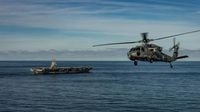The United States has dramatically ramped up its military presence in the Caribbean and the waters off South America, deploying the USS Gerald R. Ford aircraft carrier and its strike group in a move the Pentagon says is aimed at disrupting drug trafficking networks. The escalation comes after a series of rapid, lethal strikes on boats suspected of carrying narcotics, and amid rising tensions with both Venezuela and Colombia. As the region braces for what some fear could spiral into a broader conflict, the Trump administration’s aggressive tactics are drawing both praise and concern, with critics warning of the potential for unintended consequences.
On October 24, 2025, the Pentagon announced that the USS Gerald R. Ford, accompanied by five destroyers, would be heading to the U.S. Southern Command region, which includes the Caribbean and the waters off the coast of Venezuela. According to Pentagon spokesperson Sean Parnell, the deployment "will enhance and augment existing capabilities to disrupt narcotics trafficking and degrade and dismantle transnational criminal organizations." Parnell emphasized on social media that the increased U.S. force presence "will bolster U.S. capacity to detect, monitor, and disrupt illicit actors and activities that compromise the safety and prosperity of the United States homeland and our security in the Western Hemisphere."
The USS Ford’s strike group, as of Friday, was docked in Croatia on the Adriatic Sea, with one destroyer in the Arabian Sea and another in the Red Sea, according to an Associated Press source familiar with the operation. While the Pentagon has not confirmed how long it will take for the full strike group to reach the Caribbean, the addition of the carrier could bring nearly 4,500 more sailors and nine squadrons of aircraft to a region already crowded with more than 6,000 U.S. sailors and Marines on eight warships.
This surge in military might follows a campaign launched by President Donald Trump in early September, during which at least 10 vessels suspected of narcotics smuggling have been destroyed in U.S. strikes. These operations have left at least 43 people dead, according to Defense Secretary Pete Hegseth. The most recent strike, announced Friday, targeted a boat operated by the Venezuelan gang Tren de Aragua, resulting in six fatalities. Hegseth has not minced words about the administration’s approach, declaring on social media, "If you are a narco-terrorist smuggling drugs in our hemisphere, we will treat you like we treat Al-Qaeda. Day or NIGHT, we will map your networks, track your people, hunt you down, and kill you."
The Trump administration has designated Tren de Aragua—a gang that originated in a Venezuelan prison—as a foreign terrorist organization, blaming it for much of the region’s violence and drug trafficking. At least four of the boats struck by U.S. forces are believed to have originated from Venezuela. The administration’s campaign has also extended to Colombia, where, on October 24, the U.S. imposed sanctions on President Gustavo Petro, his family, and a member of his government over allegations of involvement in the global drug trade.
Military assets already deployed to the region include 10 F-35 stealth fighters, a nuclear submarine, and eight Navy ships. The show of force has been further underscored by aerial maneuvers: at least one U.S. B-1B bomber flew over the Caribbean near Venezuela on October 23, while several B-52 bombers circled close to the country’s coastline the previous week.
President Trump has drawn a direct comparison between the current crackdown on drug cartels and the post-9/11 war on terror. Declaring drug cartels to be unlawful combatants, he has invoked the same legal authority used by the Bush administration after the September 11 attacks. In a roundtable at the White House, Trump made his position clear, saying, "I think we’re just going to kill people that are bringing drugs into our country, OK? We’re going to kill them, you know? They’re going to be like, dead." When pressed by reporters on whether he would seek congressional authorization for military action, Trump replied that it was not part of his plan. "The land is going to be next," he warned, suggesting that strikes on land-based targets might be imminent.
These developments have set off alarm bells in Caracas. Venezuelan President Nicolás Maduro has repeatedly accused the U.S. of using the fight against drugs as a pretext to overthrow his government. On October 24, Maduro charged that the Trump administration was "fabricating a war that we are going to prevent." He told state broadcasters, "They promised they would never again get involved in a war, and they are fabricating a war that we are going to prevent." Maduro also praised Venezuela’s security forces and civilian militias for conducting defense exercises along approximately 1,200 miles of coastline, boasting that "100% of all the country’s coastline was covered in real time, with all the equipment and heavy weapons to defend all of Venezuela’s coasts if necessary."
Regional analysts say the U.S. military’s presence is about more than just drugs. Elizabeth Dickinson, senior analyst for the Andes region at the International Crisis Group, told the Associated Press, "An expression that I’m hearing a lot is ‘Drugs are the excuse.’ And everyone knows that. And I think that message is very clear in regional capitals. So the messaging here is that the U.S. is intent on pursuing specific objectives. And it will use military force against leaders and countries that don’t fall in line."
Lawmakers in Washington, meanwhile, are split over the administration’s bold approach. Senator Andy Kim, a Democrat from New Jersey and a former Pentagon and State Department adviser, voiced deep concern: "I’ve never seen anything quite like this before. We have no idea how far this is going, how this could potentially bring in, you know, is it going to be boots on the ground? Is it going to be escalatory in a way where we could see us get bogged down for a long time?" On the other hand, Republican Representative Mario Diaz-Balart of Florida praised Trump’s resolve, stating, "It’s about time. While Trump obviously hates war, he also is not afraid to use the U.S. military in targeted operations. I would not want to be in the shoes of any of these narco-cartels."
Complicating matters is the looming threat of Tropical Storm Melissa, which has stalled in the central Caribbean and could soon intensify into a hurricane, potentially affecting both military operations and the region’s already tense atmosphere.
As the USS Gerald R. Ford and its strike group make their way toward the Caribbean, the world watches closely. The stakes are high, and the possibility of escalation—whether intended or not—seems more real than ever. For now, all eyes are on the horizon, waiting to see just how far Washington’s war on drugs will go.




